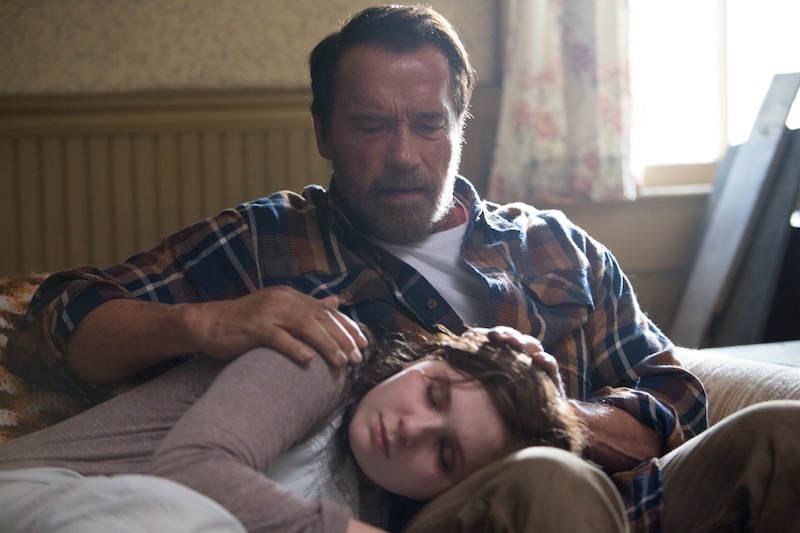Henry Hobson has been given a one-of-a-kind opportunity to showcase Arnold Schwarzenegger’s never-before-seen tender side with Maggie. I welcome my readers to send in examples of other low-key films the Terminator star has acted in, but I expect to receive no tips.
The post-apocalyptic film also hands the filmmaker a chance to re-imagine zombie movies that star “the infected”. Screenwriter John Scott 3 has crafted a story concerning the rights of the terminally ill, and the ethics involved with caring for a loved one who has a foreseeable grim future. Schwarzenegger plays Wade, an honourable man who sticks by his daughter Maggie (Abigail Breslin) despite her contagious disease and deteriorating condition threatening the woodsy community.
Maggie has an admirable style; successfully blending itself into weary, desolate environments that consistently maintain an unsafe lingering vibe. However, Maggie has a hard time committing to consistency, anxiously channeling ever-changing tonal twists. Potential awaits while various building blocks (such as the actors and the film’s director) remain skeptical and are never willing to allow the film to wash over them.
Take Schwarzenegger, for instance. I commend the Hollywood actor on his confidence in this project. He not only plays the lead role, but he also acts as one of the film’s producers. His willingness to temporarily change career gears is nice, but he’s far too recognizable to disguise himself as a lowly country farmer. His presence can’t stop evoking intimidation as he remains attached to his blockbuster authority, which becomes a problem when the script calls on sensitivity during more emotional scenes. Breslin, on the other hand, is quite good as a tormented patient who is trying to embrace her last days while in a state of shock and disfigurement.
John Scott 3 could’ve found other ways to address the themes in his script as well. He has characters listen to a radio that seems to be always tuned in to Exposition FM, and our interest starts to fade as we patiently wait through Maggie’s transformation to eventually get to her inevitable conclusion.
Too much of Maggie is dull. It’s an attractive horror/drama, but predictable and graceless. After working behind-the-scenes on various acclaimed movies (The Help, August: Osage County, The Tree of Life), this was Henry Hobson’s chance to show audiences what he’s capable of as a filmmaker. This was an independent production that – I believe – allowed him to reach for new heights. Sadly, Hobson decided to use the broad side of the knife; perhaps to solidify himself on a shortlist of indifferent up-and-comers to safely direct a franchise.





Leave a comment